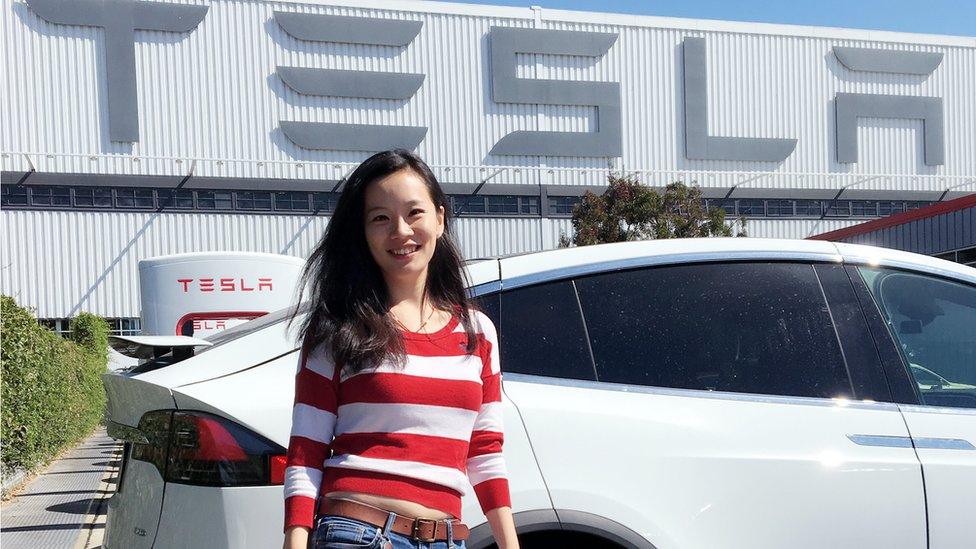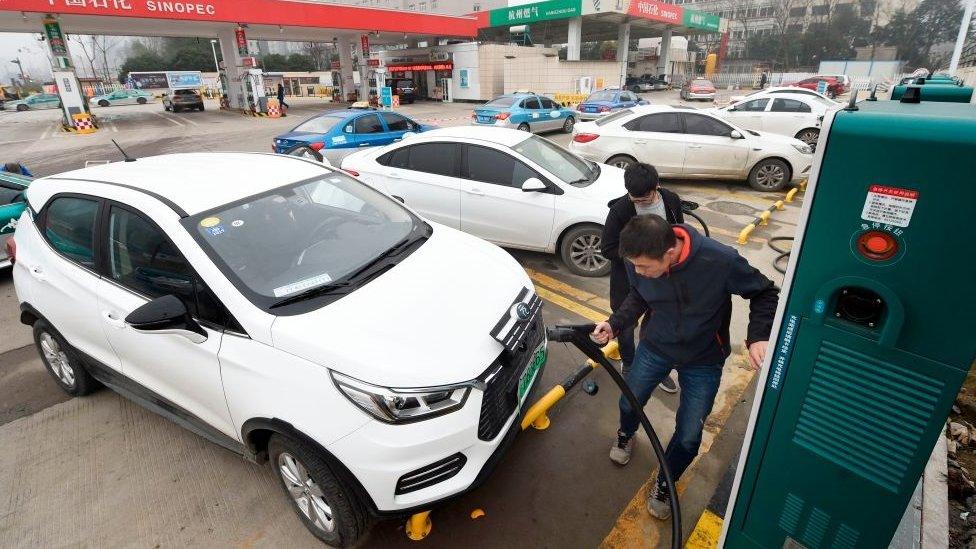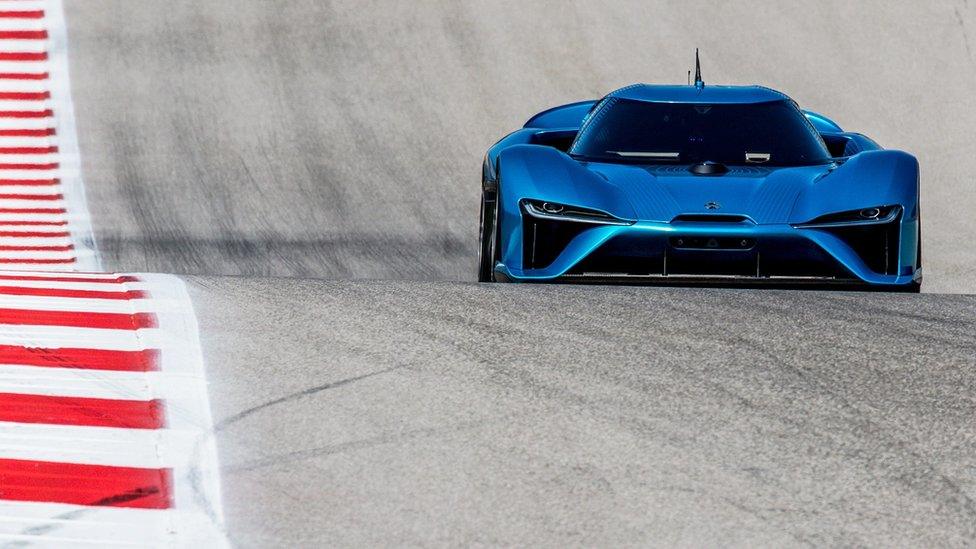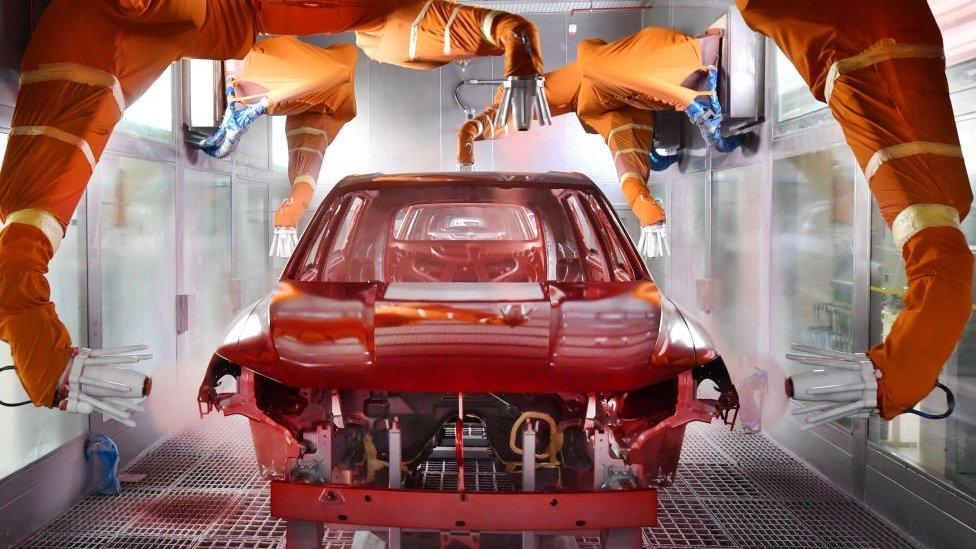The uncertain future for China's electric car makers
- Published

Choosing an electric car was an easy decision for Shenzhen resident Han Zhu
Han Zhu is on a mission to go green. The 29-year-old data analyst wants her next car to be electric. But her reasons for buying an electric vehicle are in part practical.
In the southern Chinese city of Shenzhen, government restrictions on the number of petrol cars sold each year mean she would have to enter a lottery or auction to be able to buy a petrol vehicle.
"There is a possibility you may never get it. With the electric vehicle green licence, you don't have to wait in line," she says.
Shenzhen has become the showpiece capital for the Chinese electric dream. In 2017 it became the first city in the world to introduce a fleet of electric buses. A year later, the government rolled out a plan to replace city taxis with electric cars.
"In Shenzhen, in almost every residential building there are two charging units. One out of 10 cars on the street are Teslas," she says. "In China if the policy leads in one direction, technology and money goes in that direction too," she says.

China has the world's biggest market for electric vehicles
In less than a decade China's new electric vehicle market has become the largest in the world. In 2018 more than a million electric vehicles were sold in China, more than three times the number sold in the US.
Beijing invested an estimated $50bn (£43bn) in the industry, hoping that today's dominance of the electric vehicle market would lead to global automobile supremacy tomorrow.
And thus far the policy has been working. Over the last three years the number of Chinese electric vehicle manufacturers has tripled, with more than 400 registered nationwide.
But that breakneck expansion alarmed the government. Last year it decided to put the brakes on by withdrawing approximately half of its financial incentives for buyers.
A slump in sales quickly followed, in the last quarter of 2019 sales for electric vehicles plummeted.
Now the coronavirus has supplied a second punch.
Manufacturers have been forced to halt production lines and close dealerships in a bid to stop the spread of virus.
Overall auto sales in plunged 79% in February compared with the same month in 2019, according to figures from the China Association of Automobile Manufacturers. Sales of new energy vehicles (NEVs) fell for the eighth month in a row.
"China's auto market was already reeling from a large drop in demand in 2019. In 2020 no carmaker has been immune to the effects of the coronavirus. That includes everyone from the oldest joint ventures producing internal combustion engine SUVs to the most innovative upstarts making connected electric vehicles," says Scott Kennedy from the Center for Strategic and International Studies.
"The vast majority [of electric car makers] will not survive. But how long they survive and whether industry consolidation occurs through lots of mergers or bankruptcies will depend on the willingness of the government."

The NIO EP9 is one of the fastest electric cars in the world
After listing on the New York Stock Exchange in 2018 and raising billions of dollars, NIO is perhaps the highest-profile Chinese maker of electric cars.
But in the five years since it was founded it has been beset by problems and has burned through hundreds of millions of dollars. In 2019 the company cut 2,000 jobs on the back of falling revenues. In February it announced it had signed a tentative agreement with a local government that has pledged to fund the company.
"China is a huge market growing at an immense pace. We will adjust and adapt to the market condition," said an NIO spokesperson.
And it's not just the car makers. China has some giant makers of components, such as batteries.
In 2018 CATL, a Chinese electric battery maker, became the official supplier of BMW's electric cars.
Last month Tesla announced it would enter into an agreement with the company to supply batteries for Tesla's newly built Shanghai mega-plant, capable of producing 500,000 vehicles a year.

China's BYD is the one of the world's biggest makers of electric vehicles
But despite that apparent success, analysts have their doubts.
"Chinese auto and battery technology is still not world-class. CATL and BYD are strong battery makers, but they are still somewhat behind technologically from their South Korean and Japanese counterparts. And Chinese automakers are still second-class producers even in their own country and they have barely any sales outside China," says Mr Kennedy.
For car buyers, that question of quality hangs over China's electric car makers.
Yi Zhi Yong, a middle-aged entrepreneur, drives a hybrid car made by Chinese manufacturer BYD. Backed by US billionaire Warren Buffett, the company was the third-largest battery-only electric car producer in the world in 2019, according to research by EV-volumes.com. Tesla sold the most, followed by another Chinese firm, BAIC.
He didn't buy a pure electric vehicle because he is not confident about the quality.


"The quality of domestic pure electric vehicles is not good at the moment," he says. "No domestic pure electric vehicle is worth buying yet."
But he feels the progress made by China is a source of national pride. "In the 1990s we couldn't imagine that China could build cars that can compete with the Japanese," he says.
Back in Shenzhen, Han Zhu says the rolling back of government subsidies won't put her off buying an electric vehicle. But rather than buying a Chinese marque, she has her eye on a Tesla.
"I think that they are totally different. I was super excited about Tesla but not other electric cars," she says.